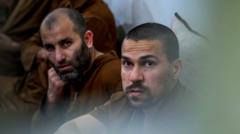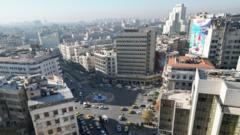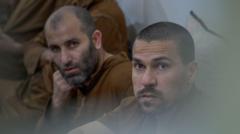With the recent fall of the Assad regime, a surge of Syrians have flocked to Sednaya prison in search of relatives who vanished amid the tumultuous civil war. This article explores the prison's dark history of torture and execution, shedding light on the ongoing quest for justice and the reunification of families devastated by years of oppression.
The Aftermath of Sednaya Prison: Uncovering the Stories of Syria's Forgotten Detainees

The Aftermath of Sednaya Prison: Uncovering the Stories of Syria's Forgotten Detainees
As the Assad regime collapses, families in Syria rush to the notorious Sednaya prison in hopes of finding loved ones lost to human rights abuses during the civil war.
As the Syrian civil war's power dynamics shift with the crumbling of the Assad regime, Sednaya prison, infamous for its brutality, has once again come into the spotlight. Families are rushing to the prison, frantically seeking news about loved ones who may have been imprisoned during the 13-year conflict. Reports from human rights organizations paint a chilling picture of Sednaya’s history, detailing the torture, inhumane treatment, and mass executions that transpired within its walls.
The prison, located just north of Damascus, is widely recognized for its horrific conditions, with allegations dating back prior to the civil war. Conditions deteriorated drastically during the conflict, making it a focal point for atrocities orchestrated by the Assad regime. Activists estimate that tens of thousands were detained in Sednaya, facing extreme cruelty including beatings, deprivation of essential needs, and execution without trial. Over 30,000 detainees reportedly lost their lives in this place of horrors.
As rebel forces have announced the opening of prison gates, families previously paralyzed by uncertainty are now confronted with a mix of hope and dread. Many fear that their loved ones will not be found alive, while others hold onto the fragile hope of reunion. Sednaya prison's legacy continues to cast a long shadow over Syria's future, signaling the immense struggle for accountability and healing in a country marked by deep scars of conflict.
As the dust settles on the regime's fall, the challenges of recovery and reconciliation are just beginning, with the return of former detainees being both a poignant moment and a reminder of the painful history that must be acknowledged.



















